34 have author last names that start with F have author last names that start with F

Heritage language (HL) learning and teaching presents particularly difficult challenges. Melding cutting-edge research with innovations in teaching practice, the contributors in this volume provide practical knowledge and tools that introduce new solutions informed by linguistic, sociolinguistic, and educational research on heritage learners. Scholars address new perspectives and orientations on designing HL programs, assessing progress and proficiency, transferring research knowledge into classroom practice, and the essential question of how to define a heritage learner. Articles offer analysis and answers on multiple languages, and the result is a unique and essential text—the only comprehensive guide for heritage language learning based on the latest theory and research with suggestions for the classroom.

Saaq al-Bambuu (The Bamboo Stalk) by Kuwaiti novelist Saud al-Sanousi provides students at the intermediate-advanced Arabic language level the opportunity to engage with an award-winning work of contemporary fiction. This abridged version has been approved by the author, authenticating the richness of a text that offers students the means to develop vocabulary and reading fluency while sensitizing them to the stylistics of the language. The novel is a coming-of-age story of a half-Filippino, half-Kuwaiti teen who returns to his father's Kuwait. There, he explores his own identity as a poor Filipino in a culture he does not know well and receives a mixed welcome from his own wealthy relatives. Universal concepts of identity, faith, belonging, poverty/wealth, and otherness are explored through a poetic narrative and engaging plot that will keep students captivated from the first line to the very last page.
Included within the book are chapter exercises that develop linguistic and cultural competencies, a short biography of the author, and glossaries of literary terms and devices. As with Laila Familiar's Sayyidi wa Habibi, this authorized version of the abridged text by a contemporary Arabic author will be warmly embraced by college and university students of Arabic as well as by independent learners.
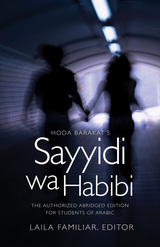
Sayyidi wa Habibi (My Master and My Love) is a novel by acclaimed Lebanese author Hoda Barakat, abridged in the original Arabic in this volume for learners of Arabic at the advanced low proficiency level. Designed as a supplementary text that adds variety and fun to a regular course on Arabic, it is complete with exercises that guide learners through the story and help them improve their Arabic skills, introducing learners of the language to the world of contemporary Arabic literature and improving their knowledge of Arabic culture.
Set against the backdrop of the Lebanese Civil War, this intriguing novel relates the struggles of Wadie, a young man who leaves school and becomes corrupted by crime, and his wife, Samia, who flees with him to Cyprus. Universal questions of existence are masterfully portrayed through eloquent prose that keeps readers engaged until the last line. Laila Familiar provides introductory materials, a short biography of the author, and exercises that develop linguistic and cultural competencies. Audio files of Barakat reading five passages from the work, along with a recorded interview, are available free on the press website in order to help students improve their listening skills.
This authorized version of the abridged text of Sayyidi wa Habibi will be warmly embraced by college and university students of Arabic as well as by independent learners.

A great deal has transpired in the cyber realm during the past year. These events, particularly the Snowden Affair, have drastically shaped the debate over state power projection and its consequences. Global public discourse previously tended to center upon the Internet as a democratizing force, capable of weakening the control of the nation-state. The Internet transcended national borders and empowered the masses at the expense of traditional power blocks. However, this battle for the control of cyberspace is far from over. The nation-state is attempting to retrench its power in the digital realm, and the forces of centralization are appearing to gain strength in the struggle between diffusion and consolidation. This shift has raised serious questions regarding the responsibilities and limits of government cyber control. State Building on a New Frontier—the third edition of our annual International Engagement on Cyber series—attempts to explore some of these difficult themes. This edition also features articles that deal with the technical side of the cyber discussion, namely attempts to create appropriate standards for continuing infrastructure development.
The Georgetown Journal of International Affairs is the official publication of the Edmund A. Walsh School of Foreign Service at Georgetown University. Each issue of the journal provides readers with a diverse array of timely, peer-reviewed content penned by top policymakers, business leaders, and academic luminaries. Annual peer reviewed ‘special editions’ feature collected academic analysis on rapidly changing domains within the arena of international affairs, including the International Engagement on Cyber series.
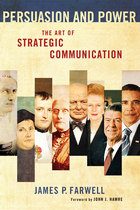
Now more than ever, in the arenas of national security, diplomacy, and military operations, effective communication strategy is of paramount importance. A 24/7 television, radio, and Internet news cycle paired with an explosion in social media demands it.
According to James P. Farwell, an expert in communication strategy and cyber war who has advised the U.S. SPECIAL OPERATIONS COMMAND and the Department of Defense, and worked nationally and internationally as a media and political consultant, this book examines how colorful figures in history from Julius Caesar to Winston Churchill, Napoleon to Hugo Chavez, Martin Luther to Barack Obama and Ronald Reagan, have forged communication strategies to influence audiences.
Mark Twain said that history doesn't repeat itself, but rhymes. In showing how major leaders have moved audiences, Farwell bears out Twain's thesis. Obama and Luther each wanted to reach a mass audience. Obama used social media and the Internet. Luther used the printing press. But the strategic mindset was similar. Hugo Chavez identifies with Simon Bolivar, but his attitude towards the media more closely echoes Napoleon. Caesar used coins to build his image in ways that echo the modern use of campaign buttons. His "triumphs," enormous parades to celebrate military victories, celebrated his achievements and aimed to impress the populace with his power and greatness. Adolph Hitler employed a similar tactic with his torchlight parades.
The book shows how the US government's approach to strategic communication has been misguided. It offers a colorful, incisive critical evaluation of the concepts, doctrines, and activities that the US Department of Defense and Department of State employ for psychological operations, military information support operations, propaganda, and public diplomacy.
Persuasion and Power is a book about the art of communication strategy, how it is used, where, and why. Farwell's adroit use of vivid examples produce a well-researched, entertaining story that illustrates how its principles have made a critical difference throughout history in the outcomes of crises, conflicts, politics, and diplomacy across different cultures and societies.

Twenty-four linguists analyze natural and social differences in language form, use, and attitudes.

This collection of different perspectives on language variation serves as a companion volume to New Ways of Analyzing Variation in English.


Metropolitan Governance is the first book to bring together competing perspectives on the question and consequences of centralized vs. decentralized regional government. Presenting original contributions by some of the most notable names in the field of urban politics, this volume examines the organization of governments in metropolitan areas, and how that has an effect on both politics and policy.
Existing work on metropolitan governments debates the consequences of interjurisdictional competition, but neglects the role of cooperation in a decentralized system. Feiock and his contributors provide evidence that local governments successfully cooperate through a web of voluntary agreements and associations, and through collective choices of citizens. This kind of "institutional collective action" is the glue that holds institutionally fragmented communities together.
The theory of institutional collective action developed here illustrates the dynamics of decentralized governance and identifies the various ways governments cooperate and compete. Metropolitan Governance provides insight into the central role that municipal governments play in the governance of metropolitan areas. It explores the theory of institutional collective action through empirical studies of land use decisions, economic development, regional partnerships, school choice, morality issues, and boundary change—among other issues.
A one-of-a-kind, comprehensive analytical inquiry invaluable for students of political science, urban and regional planning, and public administration—as well as for scholars of urban affairs and urban politics and policymakers—Metropolitan Governance blazes new territory in the urban landscape.

Women have been actively involved the United States military for more than fifty years, but the ban on their participation in combat remains a hotly debated issue. In this provocative book Lorry M. Fenner, an active-duty Air Force intelligence officer, calls for opening all aspects of military service to women. Marie deYoung, a former Army chaplain, argues that keeping women out of combat is in the best interests of both sexes and crucial to the effectiveness of the military as a whole.
Fenner bases her argument for inclusion of women on the idea that democracies require all citizens to compete in public endeavor and share in civic obligation. She contends that, historically, reasons for banning women from combat have been culturally biased. She argues that membership in a combat force should be based on capability judged against appropriate standards. Moreover, she maintains that excluding women hampers the diversity and adaptability that by necessity will characterize the armed forces in the twenty-first century.
In contrast, deYoung declares that the different physical fitness standards for men and women would, in combat, lower morale for both sexes and put women at risk of casualty. Further, she contends that women have neither the physical or emotional strength to endure the overall brutality of the combat experience. She also asserts that calls for lifting the combat ban are politically motivated and are inconsistent with the principles of American democracy and the mission of national defense.
With each author responding to the views of the other, their exchange offers a valuable synthesis of the issues surrounding a longstanding debate among policymakers, military personnel, and scholars of both military history and women’s studies.

What horrors will the twenty-first century bring? For many people, a clash of civilizations and a perilous return to great power rivalries are the dominant visions of things to come. Fueled by daily headlines, overwhelming majorities of people from all walks of life consider the world to be a far more chaotic, frightening, and ultimately more dangerous place than ever before. Christopher J. Fettweis argues that these impressions, however widespread, are wrong.
Dangerous Times? is an examination of international politics that reveals both theoretical logic and empirical data that support the vision of a future where wars between great powers are unlikely and transnational threats can be contained. Despite popular perception, today a far greater percentage of the world’s population lives in peace than at any time in history, and the number and intensity of all types of warfare have dropped steadily since the early 1990s. Terrorism, though reprehensible, can be combated and can actually increase international cooperation among states fighting a common threat. World wars like those of the twentieth century—the true clash of civilizations—are unlikely to be repeated in the close-knit world of the twenty-first century.
In this sharp and insightful book, Fettweis discusses this revolution in human history and its ramifications for international relations theory. He suggests a new vision for a more restrained U.S. grand strategy and foreign policy and reveals how, despite pessimistic perceptions to the contrary, the world is more likely entering a golden age of peace and security.

One of the most important theologians of the modern era, Karl Rahner is best known for his efforts to make Christianity credible in light of the intellectual questions of modern culture. Stephen M. Fields, SJ, now explains how Rahner developed his metaphysics as a creative synthesis of Thomism and the modern philosophical tradition. Focusing on Rahner's core concept of the Realsymbol, which posits all beings as symbolic, Fields establishes the place of the Realsymbol in philosophical theories of the symbol. He particularly concentrates on those key aspects of Rahner's metaphysics-his theories of finite realities and language—that have received insufficient attention.
By examining a wide range of Rahner's works in the context of twelve medieval, modern, and contemporary thinkers, Fields locates the origins of this seminal thinker's metaphysics to an extent never before attempted. He notes the correlations that exist between the Realsymbol and such work as Aquinas's theory of the sacraments, Goethe's and Hegel's dialectics, Moehler's view of religious language, and Heidegger's aesthetics.
Through this analysis, Fields reveals the structural core of Rahner's metaphysics and shows how art, language, knowledge, religious truth, and reality in general are all symbolic. Being as Symbol opens new perspectives on this important thinker and positions him in the broader spectrum of philosophical thought.

A comprehensive overview of the contribution of Catholic social thought to business ethics
Can a religion founded on loving one’s neighbor give moral approval to profit-seeking business firms in a global economy? What should characterize the relationship between faith and economic life? What can businesses, employees, and executives do to contribute to the common good and to make their practices and society more ethical?
Business Ethics and Catholic Social Thought provides a new and wide-ranging account of these two ostensibly divergent fields. Focusing on the agency of the business person and the interests of firms, this volume outlines fundamental issues confronting moral leaders and corporations committed to responsible business practices.
The book leads with interviews of three Catholic CEOs and the intellectual history of business ethics in Christianity before examining fundamental moral concerns regarding business: its purpose, autonomy, practical wisdom, and the technocratic paradigm. Contributing authors also consider management science, the motivations of business leaders, the role of luck in personal success, the traditional moral justifications for business, and more. These contributions bring new depth to the application of Catholic social thought to business ethics during a time when economic crisis demands a reevaluation of business and its contribution to society.

Are we entitled to be confident that our moral judgements can be objective? Can they express insights into aspects of reality, rather than mere feelings, tastes, desires, decisions, upbringing, or conventions? Why must we consider some of our choices to be free, and how do our free choices matter? How far should our moral judgements be based on assessments of expected consequences? Can utilitarianism, and other consequentialist or proportionalist theories, be anything more than the rationalization of positions taken on other grounds?
The main theme of this book is the challenge to ethics from philosophical scepticism and from contemporary forms of consequentialism. But in seeking to meet this challenge, the book develops a sustained philosophical argument about many of the central questions of ethics. It reviews classical positions, and challenges some long-influential interpretations of those positions. It also reviews and participates in some recent developments and controversies in Anglo-American ethical theory.
The activity of ethical theorizing itself is shown to be a matter of free and intelligent decision, in pursuit of intelligible good; it thus provides a test-case for any ethical theory.

By analyzing the amalgam of Greek philosophy, Jewish and Christian teachings, and secular humanism that composes our dominant ethical system, the authors of this volume explore the question of whether or not Western and non-Western moral values can be commingled without bilateral loss of cultural integrity. They take as their philosophical point of departure the observation that both ethical relativism and ethical absolutism have become morally indefensible in the context of the multicultural American life, and they variously consider the need for an ethical middle ground.

Through the centuries, at the heart of Catholic moral theology is a fundamental question: How do we behave responsibly in the face of moral uncertainty? Attempts to resolve problems of everyday life led to the growth of a variety of moral systems, one of which emerged in the early 17th century and was known as "probabilism." This method of solving difficult moral cases allowed the believer to rely upon a view that was judged defensible in terms of its arguments or the authorities behind it, even if the opposite opinion was supported by stronger arguments or more authorities. The theologian Juan Caramuel, a Spanish Cistercian monk whom Alphonso Liguori famously characterized as "the prince of laxists," has been regarded as one of the more extreme—and notorious—proponents of probabilism. As the only full-length English study of Caramuel's theological method, Defending Probabilism seeks to reappraise Caramuel's legacy, claiming that his model of moral thinking, if better understood, can actually be of help to the Church today.
Considered one of the most erudite theologians of his age, a scientist and scholar who published works on everything from astronomy and architecture to printing and Gregorian chant, Caramuel strove throughout his life to understand probabilism's theological and philosophical foundations as part of his broader analysis of the nature of human knowledge.
In applying Caramuel's legacy to our own time, Defending Probabilism calls for a reconsideration of the value of provisional moral knowledge. Fleming's study shows that history matters, and that to attain any position on moral certitude is a difficult and painstaking process.

Most of us are content to see ourselves as ordinary people—unique in ways, talented in others, but still among the ranks of ordinary mortals. Andrew Flescher probes our contented state by asking important questions: How should "ordinary" people respond when others need our help, whether the situation is a crisis, or something less? Do we have a responsibility, an obligation, to go that extra mile, to act above and beyond the call of duty? Or should we leave the braver responses to those who are somehow different than we are: better somehow, "heroes," or "saints?"
Traditional approaches to ethics have suggested there is a sharp distinction between ordinary people and those called heroes and saints; between duties and acts of supererogation (going beyond the expected). Flescher seeks to undo these standard dichotomies by looking at the lives and actions of certain historical figures—Holocaust rescuers, Martin Luther King, Jr., Dorothy Day, among others—who appear to be extraordinary but were, in fact, ordinary people. Heroes, Saints, and Ordinary Morality shifts the way we regard ourselves in relationship to those we admire from afar—it asks us not only to admire, but to emulate as well—further, it challenges us to actively seek the acquisition of virtue as seen in the lives of heroes and saints, to learn from them, a dynamic aspect of ethical behavior that goes beyond the mere avoidance of wrongdoing.
Andrew Flescher sets a stage where we need to think and act, calling us to lead lives of self-examination—even if that should sometimes provoke discomfort. He asks that we strive to emulate those we admire and therefore allow ourselves to grow morally, and spiritually. It is then that the individual develops a deeper altruistic sense of self—a state that allows us to respond as the heroes of our own lives, and therefore in the lives of others, when times and circumstance demand that of us.
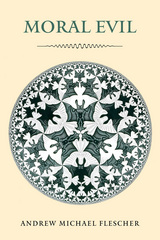
The idea of moral evil has always held a special place in philosophy and theology because the existence of evil has implications for the dignity of the human and the limits of human action. Andrew Michael Flescher proposes four interpretations of evil, drawing on philosophical and theological sources and using them to trace through history the moral traditions that are associated with them.
The first model, evil as the presence of badness, offers a traditional dualistic model represented by Manicheanism. The second, evil leading to goodness through suffering, presents a theological interpretation known as theodicy. Absence of badness—that is, evil as a social construction—is the third model. The fourth, evil as the absence of goodness, describes when evil exists in lieu of the good—the "privation" thesis staked out nearly two millennia ago by Christian theologian St. Augustine. Flescher extends this fourth model—evil as privation—into a fifth, which incorporates a virtue ethic. Drawing original connections between Augustine and Aristotle, Flescher’s fifth model emphasizes the formation of altruistic habits that can lead us to better moral choices throughout our lives.
Flescher eschews the temptation to think of human agents who commit evil as outside the norm of human experience. Instead, through the honing of moral skills and the practice of attending to the needs of others to a greater degree than we currently do, Flescher offers a plausible and hopeful approach to the reality of moral evil.

The increasing reliance on private security services raises questions about the effects of privatization on the quality of public police forces, particularly in high-crime, low-income areas. In an effective pro-and-con format, two experts on policing offer two strikingly different perspectives on this trend towards privatization. In the process, they provide an unusually thoughtful discussion of the origins of both the public police and the private security sectors, the forces behind the recent growth of private security operations, and the risks to public safety posed by privatization.
In his critique of privatization, Peter K. Manning focuses on issues of free market theory and management practices such as Total Quality Management that he believes are harmful to the traditional police mandate to control crime. He questions the appropriateness of strategies that emphasize service to consumers. For Brian Forst, the free market paradigm and economic incentives do not carry the same stigma. He argues that neither public nor private policing should have a monopoly on law enforcement activities, and he predicts an even more varied mix of public and private police activities than are currently available.
Following the two main sections of the book, each author assesses the other's contribution, reflecting on not just their points of departure but also on the areas in which they agree. The breadth and depth of the discussion makes this book essential for both scholars and practitioners interested in policing generally and privatization in particular.
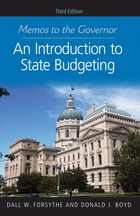
This revised and updated edition of Memos to the Governor is a concise and highly readable guidebook that explains in clear, understandable prose the technical, economic, and political dynamics of budget making. Updated with many new examples of budget quandaries from recent years, this book helps current and future public administrators untangle the knotty processes of budget preparation and implementation.
Authors Dall W. Forsythe and Donald J. Boyd outline the budgeting process through a series of memos from a budget director to a newly elected governor—a format that helps readers with little or no background understand complicated financial issues. They cover all of the steps of budget preparation, from strategy to execution, explaining technical vocabulary, and discussing key topics including baseline budgeting, revenue forecasting, and gap-closing options.
Forsythe and Boyd bring fresh insights into such issues as the importance of a multiyear strategic budget plan, the impact of the business cycle on state budgets, the tactical problems of getting budgets adopted by legislatures, and, of course, the relationship between governor and budget officer. Memos to the Governor is a painless, practical introduction to budget preparation for students of and practitioners in public administration and public-sector financial management.

With a new foreword by New York's former governor, Mario Cuomo, this revised and updated edition of Memos to the Governor is a concise guidebook that takes the reader behind governmental fiscal gobbledygook to explain in clear, understandable prose the technical, economic, and political dynamics of budget making. At all levels of government, the budget has become the battleground for policymaking and politics. This book helps current and future public administrators untangle the knotty processes of budget preparation and implementation.
Dall W. Forsythe, who served as budget director under Governor Cuomo, outlines the budgeting process through a series of memos from a budget director to a newly elected governor—a format that helps readers with little or no background to understand complicated financial issues. He covers all of the steps of budget preparation, from strategy to execution, explaining technical vocabulary, and discussing key topics including baseline budgeting, revenue forecasting, and gap-closing options.
Forsythe brings fresh insights into such issues as the importance of a multiyear strategic budget plan, the impact of the business cycle on state budgets, the tactical problems of getting budgets adopted by legislatures, and, of course, the relationship between governor and budget officer. Memos to the Governor is a painless, practical introduction to budget preparation for students of and practitioners in public administration and public-sector financial management.

Rooted in Western classical and medieval philosophies, the natural law movement of the last few decades seeks to rediscover fundamental moral truths. In this book, prominent thinkers demonstrate how natural law can be used to resolve a wide range of complex social, political, and constitutional issues by addressing controversial subjects that include the family, taxation, war, racial discrimination, medical technology, and sexuality.
This volume will be of value to those working in philosophy, political science, and legal theory, as well as to policy analysts, legislators, and judges.

In recent decades, local governments across America have increasingly turned specialized functions over to autonomous agencies ranging in scope from subdivision-sized water districts to multi-state transit authorities. This book is the first comprehensive examination of the causes and consequences of special-purpose governments in more than 300 metropolitan areas in the United States. It presents new evidence on the economic, political, and social implications of relying on these special districts while offering important findings about their use and significance.

The Georgetown Journal of International Affairs is the official publication of the Edmund A. Walsh School of Foreign Service at Georgetown University. Each issue of the journal provides readers with a diverse array of timely, peer-reviewed content penned by top policymakers, business leaders, and academic luminaries.
In this issue, the Forum section addresses the plight of international refugees, questions about migration and cultural integration, and assylum policy. Other topics addressed in this issue include US-Iran relations, corruption in Indonesia, Chinese direct investment in Africa, and much more.
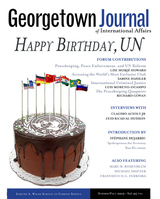
The Georgetown Journal of International Affairs is the official publication of the Edmund A. Walsh School of Foreign Service at Georgetown University. Each issue of the journal provides readers with a diverse array of timely, peer-reviewed content penned by top policymakers, business leaders, and academic luminaries.
The theme of this issue will be a look at the United Nations past, present, and future, to commemorate its 70th anniversary. The secondary theme will be global development.

eTextbooks are now available through VitalSource.com!
Called "a major innovator in his art form" by The New York Times, Baghdad-born poet Abdul Wahab Al-Bayati broke with over fifteen centuries of Arabic poetic tradition to write in free verse and became world famous in the process. Love, Death, and Exile: Poems Translated from Arabic is a rare, bilingual facing-page edition in both the original Arabic text and a highly praised English translation by Bassam K. Frangieh, containing selections from eight of Al-Bayati's books of poetry.
Forced to spend much of his life in exile from his native Iraq, Al-Bayati created poetry that is not only revolutionary and political, but also steeped in mysticism and allusion, moving and full of longing. This collection is a superb introduction to Al-Bayati, Arabic language, and Arabic literature and culture as well.
On Al-Bayati's death in 1999, The New York Times obituary quoted him as saying once that his many years of absence from his homeland had been a "tormenting experience" that had great impact on his poetry. "I always dream at night that I am in Iraq and hear its heart beating and smell its fragrance carried by the wind, especially after midnight when it's quiet."

Measuring the Performance of the Hollow State is the first in-depth look at the influence of performance measurement on the effectiveness of the federal government. To do this, the authors examine the influence of the Government Performance and Results Act of 1993 (with consideration of the later Program Assessment Rating Tool of 2002) on federal performance measurement, agency performance, and program outcomes. They focus a systematic examination on five agencies in the U.S. Department of Health and Human Services—the Food and Drug Administration, the Centers for Medicare and Medicaid Services, the Health Resources and Services Administration, the National Institutes of Health, and the Indian Health Service. Besides representing a wide range of federal government organizational structures and program formats, these agencies offer a diverse array of third-party arrangements including states, native American tribes, scientists, medical schools, and commercial and nonprofit health care intermediaries and carriers.
Exploring the development of performance measures in light of widely varying program mandates, the authors look at issues that affect the quality of this measurement and particularly the influence of program performance by third parties. They consider factors such as goal conflict and ambiguity, politics, and the critical role of intergovernmental relations in federal program performance and performance measurement. Through their findings, they offer illumination to two major questions in public management today—what are the uses and limitations of performance measurement as a policy and management tool and how does performance measurement work when applied to the management of third-party government?
While scholars and students in public administration and governmental reform will find this book of particular interest, it will also be of use to anyone working in the public sector who would like to have a better understanding of performance measurement.

Critiques and solutions offered by social changemakers from all walks of life
The United States is living through a period of polarization and upheaval. We hunger for answers, yet too often turn to the same people and institutions, expecting different outcomes. How can this be?
America's Path Forward takes a different angle. It features award-winning social innovators from all walks of life with decades of experience of working in and with their communities across America. In twenty-two deep, idea-packed conversations, they share their analyses, practical insights, and policy recommendations—on how to gain common ground, get the country unstuck, and increase prosperity and well-being for all.
These narratives share a common thread: They see community members—workers, young people, parents, neighbors, from Appalachia to Silicon Valley, from the Gulf Coast to the Great Lakes— as creative, resourceful, and strong, with unique expertise and lived experience of the problem at hand, whose changemaking energy can be tapped to build a better future for all of us.

What role does Qatar play in the Middle East and how does it differ from the other Gulf states? How has the ruling Al-Thani family shaped Qatar from a traditional tribal society and British protectorate to a modern state? How has Qatar become an economic superpower with one of the highest per capita incomes in the world? What are the social, political, and economic consequences of Qatar’s extremely rapid development?
In this groundbreaking history of modern Qatar, Allen J. Fromherz presents a full portrait that analyzes Qatar's crucial role in the Middle East and its growing regional influence within a broader historical context. Drawing on original sources in Arabic, English, and French as well as his own fieldwork in the Middle East, the author deftly traces the influence of the Ottoman and British empires and Qatar’s Gulf neighbors on the country prior to Qatar’s meteoric rise in the post-independence era. Fromherz gives particular weight to the nation's economic and social history, from its modest origins in the pearling and fishing industries to the considerable economic clout it exerts today, a clout that comes with having the second-highest natural gas reserves in the region. He also looks at what the future holds for Qatar's economy as the country tries to diversify beyond oil and gas. Furthermore, the book examines the paradox of Qatar where monarchy, traditional tribal culture, and conservative Islamic values appear to coexist with ultra modern development and a large population of foreign workers who outnumber Qatari citizens.
This book is as unique as the country it documents—a multi-faceted picture of the political, cultural, religious, social, and economic make up of modern Qatar and its significance within the Gulf Cooperation Council and the wider region.

What role does Qatar play in the Middle East, and how does it differ from the other Gulf states? How has the ruling Al-Thani family shaped Qatar from a traditional tribal society and British protectorate to a modern state? How has Qatar become an economic superpower with one of the highest per-capita incomes in the world? What are the social, political, and economic consequences of Qatar’s extremely rapid development?
In this groundbreaking history of modern Qatar, Allen J. Fromherz analyzes the country’s crucial role in the Middle East and its growing regional influence within a broader historical context. Drawing on original sources in Arabic, English, and French as well as his own fieldwork in the Middle East, the author deftly traces the influence of the Ottoman and British Empires and Qatar’s Gulf neighbors prior to Qatar’s meteoric rise in the post-independence era.
Fromherz gives particular weight to the nation’s economic and social history, from its modest origins in the pearling and fishing industries to the considerable economic clout it exerts today, a clout that comes from having the region’s second-highest natural gas reserves. He also looks at what the future holds for Qatar’s economy as the country tries to diversify beyond oil and gas. The book further examines the paradox of Qatar where monarchy, traditional tribal culture, and conservative Islamic values appear to coexist with ultramodern development and a large population of foreign workers who outnumber Qatari citizens.
This book is as unique as the country it documents—a multifaceted picture of the political, cultural, religious, social, and economic makeup of modern Qatar and its significance within the Gulf Cooperation Council and the wider region.

In this third collection of his essays on Christian ethics, Josef Fuchs takes up a number of pressing questions both in fundamental and applied ethics.
Several essays explore the biblical basis for establishing Christian norms and principles for ethical decision-making. These deal in detail with th enature of human conscience and the effect on it fo religious values in a pluralistic culture. The author also deals with current and pressing issues of a Christian moral life: continuity and change in moral teaching as exemplified by the debate over religious freedom; pluralism in the understanding of Christian marriage as early as the twelfth century; bioethical problems dealing with the beginning and end of human life; and the general question, is there a "Catholic" ethical moral theology?

In this collection of recent essays (1988-92), all but one previously unavailable in English, noted theologian Josef Fuchs, SJ, examines key issues in normative morality. Identifying two strains, one based on natural law and a more situational one based on the Golden Rule, he explores the need for plurality in both individual and societal ethics, and the problem of universal versus only general validity. Central ideas that Fuchs develops are the concept of innovative morality as the individual's responsible search for God's will in personal situations; and the significance of the conscience in the face of official statements by the church's magisterium. Among the topics he considers are marriage and sexuality; the beginning and end of life; and international solidarity and social justice.

In this volume, Josef Fuchs has brought together 12 important essays which consider various aspects of the relationship between Christian morality and human behavior. Among the subjects he discusses are the connections between moral theology and Christian experience, the absolute character of moral norms, and the importance of ethical reflection in shaping the future of the human race.

Are nuclear arsenals safe from cyber-attack? Could terrorists launch a nuclear weapon through hacking? Are we standing at the edge of a major technological challenge to global nuclear order? These are among the many pressing security questions addressed in Andrew Futter’s ground-breaking study of the cyber threat to nuclear weapons.
Hacking the Bomb provides the first ever comprehensive assessment of this worrying and little-understood strategic development, and it explains how myriad new cyber challenges will impact the way that the world thinks about and manages the ultimate weapon. The book cuts through the hype surrounding the cyber phenomenon and provides a framework through which to understand and proactively address the implications of the emerging cyber-nuclear nexus. It does this by tracing the cyber challenge right across the nuclear weapons enterprise, explains the important differences between types of cyber threats, and unpacks how cyber capabilities will impact strategic thinking, nuclear balances, deterrence thinking, and crisis management. The book makes the case for restraint in the cyber realm when it comes to nuclear weapons given the considerable risks of commingling weapons of mass disruption with weapons of mass destruction, and argues against establishing a dangerous norm of “hacking the bomb.”
This timely book provides a starting point for an essential discussion about the challenges associated with the cyber-nuclear nexus, and will be of great interest to scholars and students of security studies as well as defense practitioners and policy makers.
READERS
Browse our collection.
PUBLISHERS
See BiblioVault's publisher services.
STUDENT SERVICES
Files for college accessibility offices.
UChicago Accessibility Resources
home | accessibility | search | about | contact us
BiblioVault ® 2001 - 2024
The University of Chicago Press









